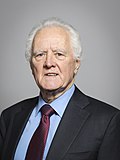13–15 April 2021 | |||||||||||||||||||||||||||||||||
| |||||||||||||||||||||||||||||||||
| |||||||||||||||||||||||||||||||||
An election for Lord Speaker, the presiding officer of the House of Lords, was held from 13 to 15 April 2021. The incumbent, Lord Fowler, announced on 25 February that he would resign from the office in late April, about four months before the end of his first term. [1] [2]


